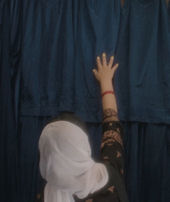In a sea of blue burqas, only a cat runs free, scampering freely from rooftop to rooftop high above the fettered women below.
This 12-minute exceptional documentary short was nominated for a British Academy Film Award (BAFTA) for best short doc. It begins by showing the agile rooftop cat, a gorgeous yellow-feathered bird in a cage, and a beautiful woman (gorgeously expressive Afsaneh Dehrouyeh) who comes into Chadari Sellers of Kabul to purchase a blue, full-length chador (burqa) for the first time.
Extremes. I criticize both the constrictions of this chador and the crazy tape-affixed, awkwardly shaped gowns some starlets wear at awards shows. One covers everything and the other covers almost nothing. To move with freedom is challenging in both worlds. It’s just that show biz folks aren’t mandated to wear their crazy costumes while Afghan women could receive a stiff consequence.
While the young Afghan woman tries on a Chador, a TV is reporting in Dari the dress rules for women: “Those women who refuse to follow the decree their male guardian will be held responsible [and] … contacted. In the second stage their male guardian will be warned and the third stage her male guardian will be imprisoned for three days. The Chadari has always been a part of our land. It has been passed down from generations to us and bring honor to our Afghan culture.” (English translation in subtitles)
The elephant in the room is not what women are wearing or the Afghan requirement to wear the chador. The issue is that totalitarian law strips freedom in all existential areas of life and culture. Early in the film the shop clerk (excellent acting by the director/writer, Elham Ehsan) is playing the traditional Afghan rabab (or rebab). The shop owner approaches him in frustrated anger telling him: “If the Taliban hears you I will be ruined. … Don’t bring that thing here again!”
I teach English to refugees, including Afghans, at my local community college. Many of the Afghan women are ambitious. One wants to be a judge. Another scrimps on her financial aid and hides it under her mattress as she saves up to buy a car. Another tells me she is here so she can keep going to school.
Afghan repression most notably censures women and the arts. But it also snakes into every facet of life: gender-role expectations, human rights, and economic opportunity. Afghans look at the West and see a wildly permissive, narcissistic, crime-ridden society and think their laws protect their moral values and tribal cultures.
But Elham Ehsas, the film’s director/writer/actor who was born in Afghanistan and immigrated to London when he was 10, thinks otherwise. He was inspired to write “Yellow” after the Taliban announced that women were not only required to wear the chador in public but were also limited in their ability to work, attend school, and move freely.
Publicity materials for “Yellow” report that the film “… is a call to action and a plea for help to not forget Afghan women who are currently still fighting for their basic human rights.” There’s not much Westerners can do, but seeing this exquisitely expressive film can help us empathize and understand their predicament.
Credits
Director/Writer: Elham Ehsas
Producers: Dina Mousawi, Catherine Tschaepe, and Azeem Bhati
Cast: Afsaneh Dehrouyeh, Elham Ehsas, Ahmad Jan Mano
Cinematography: Yiannis Manolopoulos
US Release Date: Aug. 19, 2023 (United States)
Countries of origin: United Kingdom and Afghanistan
Language: Dari
How to view this film: At the moment the publicist states there is no way to view this film.
. . .
Join us on Facebook at
http://www.facebook.com/itsjustmovies!
